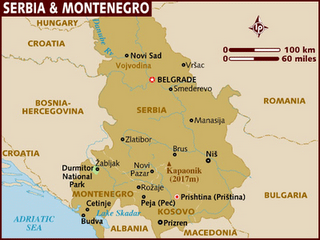
A seven-hour sticky bus ride from Belgrade brought me to Sarajevo. I saw the beautiful red-tiled rooftops of the city from a mountain ridge, but then the bus dove down the other side of the mountain and stopped at a bus station in a village. It turns out that the buses to and from Serbia stop at a Serbian bus station outside of town. It reminded me a bit of the division in Jerusalem between the Israelis and Palestinians.
Sarajevo is the beautiful capital of Bosnia-Hercegovina, and was once the cultural capital of the republic of Yugoslavia. It held the 1984 Winter Olympics, but under went a four-year siege from 1992-1995, surrounded by Serbian forces, but held in an awkward stalemate by UN peacekeeping forces before NATO forces bombed the Serbian forces surrounding the valley late in 1995.
The city sits in a valley next to a clear river. Minarets and church steeples make up the skyline, and fields of clustered white tombstones can be seen scattered on the surrounding hilltops, a reminder of the price the 300,000 occupants paid while the rest of the world sat and watched. This city has been compared to Jerusalem, as a city of tolerance with a Jewish synagogue, mosque, and churches within a hundred meters of each other. Bullet-scarred, but rebuilding, it is a tourist city again.

